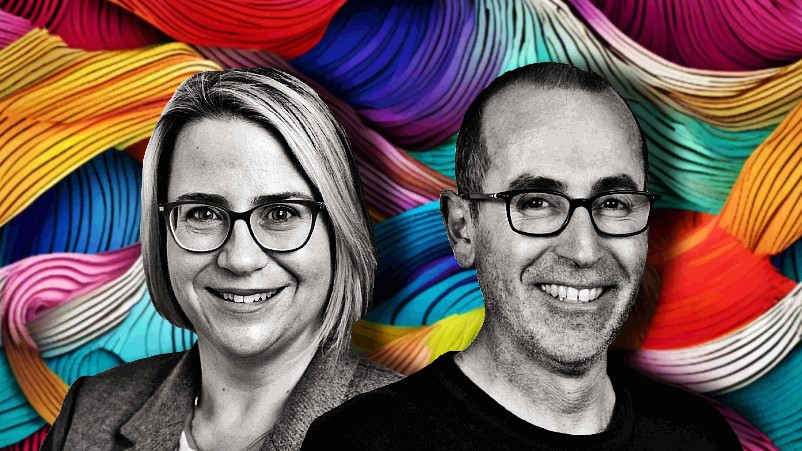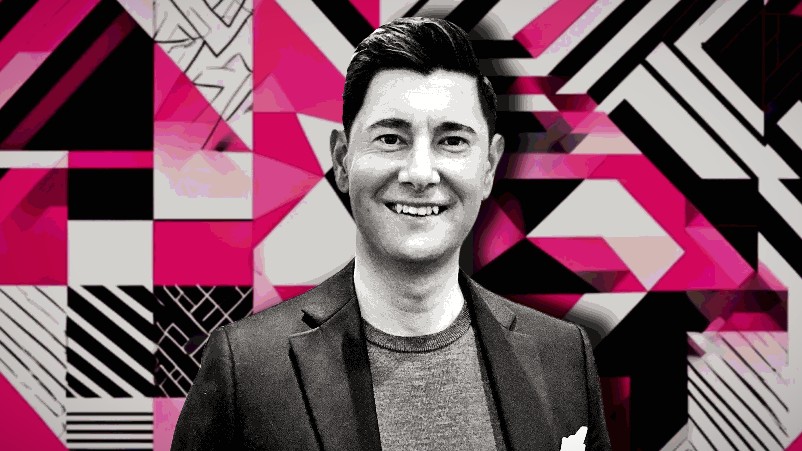Busting out of the algorithm: Seek and Square Peg cofounder Paul Bassat launches Commbank-backed Amplify to reclaim public policy discourse – who’s who of business and politics joins board

Amplify CEO Georgina Harrisson and Chairman Paul Bassat
Seek cofounder Paul Bassat has tapped funding from Commbank, Myer founder Sidney Myer’s philanthropic fund and tipped in his own money in a bid to break the algorithmic grip fracturing public discourse and narrowing policy-making. To re-link community engagement with Australia’s rule-makers he’s launching open membership platform Amplify. Former Secretary of the NSW Department of Education Georgina Harrisson is at the helm, backed by a who’s who of business and politics on the board. “The level of division in Australia has got a lot worse over the last few years. There are very clear warning signs that things will get worse if we don’t do something about it,” he tells Mi3. “And so that's ultimately the starting point for Amplify.” Now they have to get it to land with people blinkered by algorithms and with a jaundiced outlook on whether institutions can be re-engineered.
What you need to know:
- Seek and Square cofounder Paul Bassat has assembled a board of Australian business and government leaders, and secured funding from the likes of Commbank plus a range of philanthropic organisations (and tipped in his own money) to launch Amplify, and non-partisan organisation that wants to resurrect the quality of community engagement with policy development, and to help amplify the voices of engagement Australians in the halls of power.
- Prior to the launch Amplify surveyed 4,000 Australians and found a community that is cynical about the political process, distrustful of institutions, and pessimistic about the rest of the decade.
- But Australians also strongly believe the community should have more direct involvement in policy decisions, and that the country should work actively to strengthen democracy, and a surprising number – over 60 per cent – say they have participated in at least one political activity in the last year.
- And there's some fertile ground to start a change – 58 per cent of Australians say they trust their fellow citizens, and over 90 per cent agree that healthcare, housing, crime and justice, economic growth, and education are important issues, with many feeling these areas are not receiving enough political focus
- Amplify's CEO and former NSW Department of Education Secretary Georgina Harrisson has seen firsthand how the changes wrought by tech and other trends have made public policy reform harder. But ever the optimist, she says "public policy is here for the people, and they're the people that should shape it".
The algorithm means that we live largely in an echo chamber. It's an algorithm from social media but it's actually now in traditional media because as more of us consume media online, whether it's social media or traditional media, those people know exactly what we're reading. And they serve up more of what we're reading.
As one of the entrepreneurs who led the first great wave of digitisation in Australia, Seek founder and now Square Peg CEO Paul Bassat understands the two-edged nature of the changes wrought on society by technology.
In the almost three decades since he, brother Andrew Bassat, and Matt Rockman first redirected those recruitment advertising rivers of gold away from the pages of newspapers owned by the likes of News Limited and Fairfax, the emergence of digital media, smartphones, mobile apps, social media and more recently AI have upended the way we live our lives. And every new digital trend seems only to add force to the firehose of information – much of it untested – that we are assailed with every day.
We now live in a society governed by algorithms that optimise for engagement, yet one of the (perhaps) unforeseen consequences is that it's easy to get trapped inside them Bassat suggests.
“The algorithm means that we live largely in an echo chamber. It's an algorithm from social media but it's actually now in traditional media because as more of us consume media online, whether it's social media or traditional media, those people know exactly what we're reading. And they serve up on more of what we're reading.”
But technology isn't the only disrupter.
“The echo chamber is the first piece. The second piece is that there is also a backdrop of increasing intergenerational inequality, of people feeling like they're not getting ahead. And there's a backdrop that it's very hard to attract people to a career in government, a career in politics.”
“There’s a whole lot of different factors at work and the net effect of all of them in a much more complex world is it's much harder to drive change. It's harder to have proper debates about issues.”
But it's a problem Bassat believes can be solved. That's why he has founded and partly-funded Amplify. It's an organisation he believes will bring together people from different walks of life and help them to make a difference on the most important issues facing them by amplifying their many voices.
Amplify has hired Georgina Harrisson, the former Secretary of the NSW Department of Transport as its inaugural CEO – and she's backed by a board that reads like a who’s who of business and government leaders:
- Dominic Perrottet (head of US Corporate and External Relations BHP, as well as the previous Premier of NSW)
- Suzi Carp (Co-founder and Executive Director of River Capital)
- Rona Glynn-McDonald (Founding CEO of Common Ground, Director First Nations Futures)
- Kate Jones (NRL Commissioner, former Minister for Innovation, Tourism, Industry Development and Cross River Rail, Queensland)
- Gillon McLachlan (CEO of Tabcorp and former AFL CEO)
- Kate Pounder (former CEO Tech Council of Australia, former Managing Director Accenture)
- Michael Schneider (Bunnings Managing Director, FightMND Chair)
- Zara Seidler (Co-founder The Daily Aus)
There is a graveyard of policies out there, of great ideas that have gone to waste because they didn't have a strong constituency of support. [There is] really good evidence that hasn't been translated well for the community, they don't get the chance to engage with and think about. If they did, then maybe those things could have got off the ground. And it's that opportunity.
Harrison tells Mi3 she has seen firsthand the impact of those algorithms on public policy.
“There is a graveyard of policies out there, of great ideas that have gone to waste because they didn't have a strong constituency of support. [There is] really good evidence that hasn't been translated well for the community they don't get the chance to engage with and think about. If they did, then maybe those things could have got off the ground," she says. "And it's that opportunity.”
Yet for all the fragmentation and dislocation wrought by technology, Australians have remarkably consistent views over what they consider important issues, according to a survey of over 4,000 Australians that Amplify commissioned. For instance, nine out of ten cite healthcare, housing, crime and justice, economic growth, and education – but almost two-thirds believe politics today serves vested interests rather than the public good.
The survey also revealed that more than 80 per cent of Australians think politicians prioritise winning votes over developing sound policies and that 71 per cent feel discussions about politics are commonly combative or confrontational.
It’s comfortable inside those algorithms – and only 1 in 5 frequently seek out opposing views on topics.
But while the study also found an increasingly divided society, there is also an important sign of hope with 58 per cent of Australians saying they trust their fellow citizens on issues such as housing, the ageing population, and climate change, a sentiment that they do not extend for the most part to big business, major political parties, and media.
Bassat told Mi3, “Australia ... is an amazing country, but we feel that things probably aren't quite right, and that's reflected in increased levels of division. That's reflected in people just feeling like they're not being heard on issues.
“Against the backdrop globally in other democracies things are a lot more chaotic than here in Australia, but certainly, the level of division in Australia has got a lot worse over the last few years. There are very clear warning signs that things will get worse if we don’t do something about it. And so that's ultimately the starting point for Amplify.”
The organisation describes itself as non-partisan and Bassat says it was created to help people share their perspectives and opinions through surveys, webinars, online forums, and in-person events. Less a think tank than an environment where people have permission to actually think, the goal is to take community-led policy ideas to governments, effectively creating a channel for more people to influence key policy decisions.
“At our core is we're a community organisation," he adds. "We're completely nonpartisan and independent of any political party or any other group.”
As to funding, Bassat has put his own money in and says the Commbank has been a great support. Likewise, he says “We're very grateful to the Sidney Myer fund which has been a mainstay of philanthropy for probably the best part of 100 years now. And we’ve had support from a number of other philanthropic organisations.”
He says that while they are continuing to talk to other potential funders, the level of support they have achieved already has a strong funding base in place for the next few years.
Membership, however, will be free to encourage widest possible uptake.
“The idea is to give people an opportunity to have a say to debate and discuss the most important issues in our community. It's to build a broad community from all walks of life. Then we will use a bunch of different techniques to try to find what we're calling Uncommon Ground, to get the community together, to deliberate, to form views on solutions to the most important issues that we're facing as a country," adds Bassat. "Then the idea is to take those ideas and solutions amplify the voice of our community and spark change with decision-makers."
As one of those decision-makers for many years, Harrisson says she understands the challenge they face.
“If you've worked in government, you have seen reform get harder and harder to do. I've had the privilege of working with some exceptional politicians, and every single one of them has come in to make a difference for their community. But the opportunity to do that has got smaller and smaller and the campaign cycle seems to start earlier in every term, and that window of opportunity to make big reforms happen seems to be narrowing.
"At its heart, public policy is here for the people, and they're the people that should shape it.”
Among the other key findings from the survey:
- Australians are pessimistic. Only 27 per cent of respondents believe they and their families will be better off in five years. Older Australians are the most pessimistic.
- While 27 per cent of people said they do not participate in politics because they feel their input won't make a difference, a surprisingly large number, 63 per cent, say they participated in at least one political activity in the last year, primarily through educating themselves on political issues.
- Two-thirds of Australians feel society is becoming more divided. Only 11 per cent feel it is becoming more unified.
While the rise of social media may have given us the ability to hear the views of many more people, it hasn’t helped. 71 per cent of respondents find online political discussions to be confrontational, with a low percentage feeling that participants are open to changing their views. The dangers from misinformation are also ever present, with only one-third of people frequently verifying the sources that they’re reading. Meanwhile, just 20 per cent frequently seek opposing viewpoints on an issue.
Amplify will be hosting a series of in-person and online events across Australia in November titled 'Better Australia'. The initiative aims to create a platform for Australians to voice their opinions and contribute to policy decisions that affect their lives.


